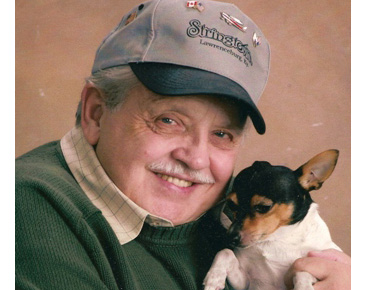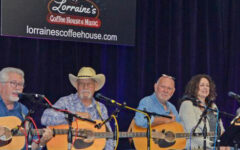
 I hope when I’m 80 years old I can say what Pete Goble said to me on the phone the other day:
I hope when I’m 80 years old I can say what Pete Goble said to me on the phone the other day:
“I’m writing more songs now than I ever did in my life and I think I’m writing better songs.”
I called him at his home in Rockwood, Michigan, where he still gets up every day and writes at 7:00 a.m.
Pete, of course, is the songwriter behind bluegrass classics such as Big Spike Hammer, Tennessee 1949, Blue Virginia Blues, Julianne, You Can Keep Your Nine Pound Hammer, Colleen Malone, and Fiddler’s Green, among others.
He began his songwriting career in the ‘60s when he became friends with J.D. Crowe when Jimmy Martin & the Sunny Mountain Boys were based out of WJR in Detroit. Pete’s first song was You’ll Be a Lost Ball, sometimes known as Lost Ball in the High Weeds, which Jimmy recorded, as did the Stoneman Family some time later.
http://www.youtube.com/watch?v=t0fXdtVteaI
Although he’s known as half of the songwriting team of Pete Goble and Leroy Drumm—who passed away in 2010—Pete was the main songwriter in the collaboration. “If I’d get stuck and needed another verse, he was good at getting a verse started and I could see where it was going and then we’d finish it. But I’d just give him credit on anything I would do – always.”
I had called Pete to talk a little about Blue Virginia Blues, one of my favorite bluegrass songs, but he didn’t recall much about writing it so long ago, which I can understand. I barely remember writing a song I wrote last week. He did say that people sometimes call it Blue Virginia Blue rather than the correct title Blue Virginia Blues.
Pete doesn’t dwell on the past. He’s working on a project of all new songs tentatively titled Let Us Sing You a Story. Like most songwriters, he didn’t want to talk too much about the songs yet. He’s still in the process of writing them, but he’s very excited about the project.
I asked him how he starts writing a song.
“I might be in a conversation with you or a friend or whatever and you might say something and I think, wow, that would be a good title. I gotta put it together, though, but it gets me on this certain train. It’s like having birth pangs. Something is coming; I don’t know what it is.”
He’s also a self-proclaimed perfectionist:
“I go back over stuff that’s been recorded, and I think, ‘What did I ever say that for?’ So, I redo little things to change it. I can’t explain it, but I hear stuff I should have done better. I’m never satisfied with what I do.”
By his estimate, he’s written over 700 songs, only about 90 of which have been recorded. I asked him if he has those unrecorded songs demoed and he said he has the lyrics to all of them, but not all of them are demoed. He went on to say, “I remember the tunes to all my songs. I don’t forget them.”
It might be a good project to record Pete singing all of those songs that have not yet been recorded by him or others.
After our conversation, Pete sent me lyrics to a few of the songs he’s working on and I can tell you that Pete Goble is alive and well and writing great songs. I can’t wait for the new album. It has no release date as of now, but Bluegrass Today will certainly let you know when it’s ready.
A few of the songs have a southwestern flavor and I asked him about that.
“I do South of the Border kinds of songs, too—about cowboys, gunfighter ballads—because we need that in our music. It’s a little different in style and it’ll get the whole world interested in it, I hope!”
Pete doesn’t play much guitar anymore, although at one time he was considered one of the best rhythm players around. He’s recovered well, though, from his 1996 plane crash and throat surgery in 2006, and I could tell from our conversation that his energy is high.
Later, he emailed me the lyrics to a song that he considers one of his best, but that hasn’t been done much since the Country Gentlemen recorded it in 1976—This Land Must Die—on the Gentlemen’s Joe’s Last Train album.
Here are the words to the chorus. It’s not a typical Pete Goble song in that it’s not really a story song, but I think it’s interesting to find out what songwriters themselves consider their best work.
Go climb the tallest mountain and look down on the earth so far below,
You’ll know the peaceful splendor, the one above intended you to know,
Then walk among the bedlam and see the man-made giants rising high,
We’ve passed our given powers but to live the man decides the land must die.
If you’re a young band looking for fresh material, there’s an 80-year-old songwriter’s songwriter in Michigan who has some great material for you.







